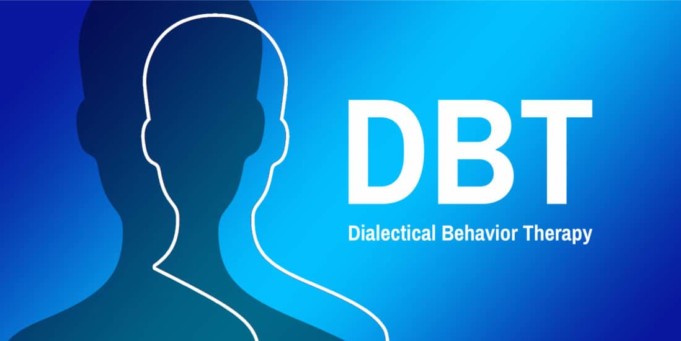Dialectical behavioral therapy (DBT) is a type of therapy used to help people going through difficult and negative situations. It is used in treating mental problems, borderline personality disorder, substance use disorder, and other kinds of emotional problems.
DBT combines two common forms of therapies: Cognitive and behavioral therapies. It is comprehensive and evidence-based.
History of Dialectical Behavioral Therapy
Dr. Marsha Linehan originated this therapy in the late 1980s. She is a psychologist and worked with people with emotional problems such as borderline personality disorder (BPD), and even suicidal people.
She also suffered from BPD while growing up. All these experiences made her think of a better therapy to help her patients. She noticed that cognitive behavioral therapy (CBT) was not that effective when used alone.
It didn’t give her the expected result she wanted with her borderline personality disorder patients. She and her team came together and created a new therapy. They added other techniques to CBT.
They made sure that this new therapy meets the unique needs of all their patients. Initially, DBT was developed to treat only BPD but now, it has been modified to include other behavioral and emotional problems.
Dialectical behavioral therapy is still used to date to treat a wide range of mental health problems like self-harm, anxiety, depression, and even eating disorders.
How Dialectical Behavioral Therapy Works
This therapy makes use of dialectics, these are philosophical procedures. DBT is based on the idea that everything is made of opposites. The founder believes that a “dialogue” between opposing forces bring about a change.
Based on this, three basic assumptions are made.
- There is a connection between everything
- Change is constant and you cannot escape it
- You can join opposites to get a closer approximation of the truth
In this therapy, both the patient and therapist work together to disentangle the seeming contradictions between change and self-acceptance. This will result in positive changes in the patient.
Aside from this use of dialectics, DBT also helps patients build four major skills which are also called modules. These skills when taught will help the patient to cope with emotional distress in positive and productive ways.
Dr. Marsha Linehan referred to these modules as the “active ingredients of DBT”. These skills are:
- Emotional regulation
- Interpersonal effectiveness
- Distress tolerance
- Mindfulness
Mindfulness and distress tolerance skills will help the patient accept his/her thoughts and behaviors. Emotional regulations and interpersonal effectiveness skills will help you change your thoughts and behaviors.
Dr. Linehan and her team added another technique called validation. This and the push for change make patients co-operative. It reduces the risks of patients suffering distress at the idea of change.
In DBT, the therapist validates the actions of the patient and assures them that they make sense. This is usually done within the context of their personal experience.
However, the therapist does not have to agree that they are the best approach in solving problems. DBT has been endorsed by the American Psychiatric Association in the treatment of borderline personality disorder.
DBT has been found to be highly effective and people who go through this therapy have shown amazing improvement. Some of the improvements highly noticed are:
- Reduced suicidal behavior and fewer incidences of suicide attempts
- Lesser rates of hospitalization and shorter time frame of hospitalization
- Control of anger and fewer emotions
- The tendency to stop treatment abruptly is reduced
- Improved social functions
The skills or Modules of Dialectical Behavioral Therapy
1. Emotional Regulation
A lot of people feel they cannot escape from their emotions. Though difficult, it is possible to manage your emotions and this is what this skill helps you with.
You will learn how to deal with primary emotional reactions. This will prevent your emotions from leading to a chain of distressing secondary reactions.
For instance, anger, which is a primary emotion, can lead to guilt, worthlessness, shame, and other distressing secondary emotions. This skill will teach you how to:
- Recognize emotions
- Overcome barriers to positive emotions
- Reduce your vulnerability
- Increase emotions with positive effects
- Be mindful of emotions without judging them
- Expose yourself to your emotions
- Not give in to emotional urges
- Solve problems in helpful ways
2. Interpersonal Effectiveness
People who have intense emotions and rapid mood swings find it difficult to relate to people. This skill will teach you how to build healthy and fulfilling relationships.
It will teach you how to feel and know what you want. This skill combines social skills, listening skills, and assertiveness training. Interpersonal effectiveness skills will help you know how to change situations while you stay true to your values and what you believe in.
This skill will help you build greater self-respect. That is why it is also known as self-respect effectiveness. It will teach you how to walk through challenges in conflicts and relationships.
You will learn how to demand what you want and take healthy steps to achieve it. This is known as objective effectiveness.
3. Distress Tolerance
One thing in this therapy that is very important is mindfulness and it will go a long way in helping you cope with distress. You will find this helpful in the moment of crisis where distress usually sets in.
With this skill, you will learn how to get through rough phases without using disruptive coping techniques like substance use and drugs. Your therapist will teach you healthy coping strategies that will help you handle your emotions well in times of crisis.
You would be taught avoidance or self-isolating. These strategies will help you feel better temporary and they don’t offer much help. However, they will prevent angry outbursts, self-harm, and substance use which will only cause more harm.
Distress tolerance skill will teach you how to:
- Distract yourself until you are calm and able to handle the emotion or situation.
- Relax by soothing yourself. You will be able to use your senses to feel at peace after going through this module.
- Improve your present moment despite the difficulty and pains you are going through
- Know the pros and cons and compare coping strategies.
4. Mindfulness
This module will help you to be aware of your present moment. It will teach you how to accept what’s happening. In this module, you will be taught how to notice your thoughts and feelings and accept them.
In DBT, mindfulness is divided into two skills: the “what” and the “how” skills.
The “what” skills will teach you what to focus on. Some examples of what you should focus on are:
- The present happenings
- Your awareness in the present moment
- Your emotions, thoughts, and sensations
- Separating your sensations and emotions from your thoughts
The “how” skills will teach you how to:
- Balance rational thoughts with emotions
- Overcome things that make mindfulness difficult or impossible. Some of these are sleepiness, restlessness, and doubt.
- Regularly use the mindfulness skill
- Take effective action
- Use radical acceptance to tolerate all aspects of yourself.
The Dialectical Thought Process
This is a believe that things change through a process of opposites. In DBT, it is believed that the situation is a thesis at first, it then becomes an anti-thesis, and finally becomes a synthesis.
An example of dialectical thinking is thinking of both positivity and aggression at the same time. You can also think of withdrawal and impulsivity, love and hate, and evaluate different answers to morality questions.
This process will help your brain understand all kinds of concepts. Your brain will understand the world and the people that live in it when it frequently examines the opposites of something.
This dialectical thinking or thought process will help to develop empathy in patients. This happens because they have considered the extreme opposites of things.
In every issue, you will be taught how to considered two extreme opposites.
The Techniques of Dialectical Behavioral Therapy
There are three techniques used in dialectical behavioral therapy. These techniques are used to teach the 4 modules or skills of DBT. Many practitioners believe that the combination of these techniques makes this therapy more effective.
The techniques of DBT are;
- One-on-one therapy
- Skills training
- Phone coaching
One-on-one therapy
This is a one hour weekly therapy during which your therapist will speak to you about what you are trying to manage or what you are working on.
Your therapist will also help you develop your skills and help you go through specific challenges.
Skills training
In DBT, skill training is done in groups and it is similar to a group therapy session. This skill group meets once a week and the session can last for up to 2 or 3 hours.
This group training can last for 24 weeks but some DBT programs repeat this skill training and in some institutions, they can last for a full year. You will learn each skill of DBT mentioned above during this skill training.
You will practice them and you will be taken through scenarios with your group members. Skill training is one of the key components/techniques of DBT.
Phone coaching
Some therapists offer this while some don’t. Those who add phone coaching to their services do this for extra support between the one-on-one appointments with your therapist.
Phone coaching is very helpful because sometimes patients can find themselves in overwhelming situations and need someone to talk to. They will be relieved when they talk to their therapist and get the extra support they need.
Your therapist will remind you how to use your DBT skills to handle the present challenge you are facing.
Similarities Between DBT and CBT
Some health experts classify DBT as a subtype of CBT. They are both alike in the sense that a lot of “talks” are involved. Talk therapy helps the patients understand why this is happening to them and teach them how to manage their thoughts and behaviors better.
Both CBT and DBT emphasize on correcting unhealthy thoughts and behaviors. Both CBT and DBT change thought patterns and behaviors.
Differences Between DBT and CBT
There are many differences between CBT and DBT. The most noticeable difference is that DBT puts more emphasis on managing emotions and interpersonal relationships.
The reason for this strong emphasis is because DBT was originated to treat borderline personality disorder. This mental condition is marked by dramatic behaviors and mood swings and this affects their relationships with people.
Another difference again is that DBT is more specific, unlike CBT. It lays great emphasis on the psychosocial aspect of the treatment. It is designed to be narrowed down to the psychosocial aspect of the daily life of the patient.
The psychosocial aspect is how someone interacts with others in their environment and relationships. The main emphasis of CBT is to identify and correct maladaptive behaviors.
DBT also focuses on accepting those characters or features that cannot be changed. This can be difficult in many situations. Another difference is that DBT is broad but it still has restrictions.
While CBT is used for a lot of mental conditions, DBT is used in treating borderline personality disorder, eating disorders, post-traumatic disorder, and a few others.
The last difference is that DBT is a long-term process while CBT is a short-term process.
DBT is really good therapy and you can find a specialist by asking your doctor or friends and families who have consulted one before. They can also be found online.
A good DBT therapist will help walk you through these skills and help you gain control of your emotions. This will improve your relationship with people and your overall quality of life.
You will learn how to live peaceably with things you cannot change. You will be constantly aware of your present moment, you won’t be afraid to feel any kind of emotion, and you will be properly trained to handle your emotions well.
Another thing DBT does for people is taking them off destructive habits and coping mechanisms. People who are addicted to all kinds of substances usually regain freedom after going through DBT therapy.
The result you will get depends on your co-operation with your therapist and how you put what you learn into practice.












